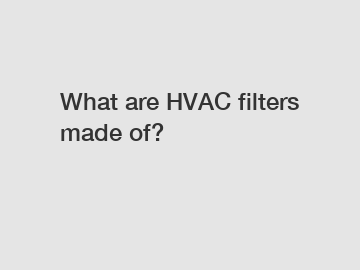What are HVAC filters made of?
What are HVAC filters made of?
Air quality is a crucial aspect of maintaining a healthy and comfortable indoor environment. HVAC (heating, ventilation, and air conditioning) systems play a vital role in ensuring proper air circulation, filtering out pollutants, and improving overall indoor air quality. Undoubtedly, one of the key components responsible for filtration is the HVAC filter. But what exactly are these filters made of? Let's unravel the mysteries surrounding the construction and materials utilized in HVAC filters.
1. Fiberglass Filters:

Fiberglass filters are among the most common types used in HVAC systems. These filters consist of layered fibers made from spun glass. The fibers create a barrier that traps dust, dirt, pollen, and other airborne particles, preventing them from circulating in the air. With a relatively low cost, fiberglass filters are effective at capturing larger particles but may fall short when it comes to smaller pollutants.
2. Pleated Filters:
Pleated filters are slightly more advanced compared to their fiberglass counterparts. They consist of an accordion-like design with pleats that increase the surface area available for filtration. Pleated filters are made of different materials such as polyester, cotton, and synthetic media. These materials are woven together to create a sturdy and efficient filter that captures a wider range of particles.
3. Electrostatic Filters:
Electrostatic filters utilize an electrostatic charge to attract and capture airborne particles. They are often constructed using self-charging polypropylene or cotton. These filters are particularly effective at trapping smaller particles, including pet dander, mold spores, and even some bacteria. Electrostatic filters are known for their high efficiency, but they may require regular cleaning or replacement to maintain optimal performance.
4. High-Efficiency Particulate Air (HEPA) Filters:
HEPA filters are renowned for their exceptional air filtration capabilities. These filters are constructed with a fine mesh material made from fiberglass fibers, randomly arranged to form a dense web. HEPA filters can trap a significant amount of particles, including pollen, dust mites, mold spores, and even some viruses. Due to their efficiency, HEPA filters are commonly used in healthcare facilities, laboratories, and environments where superior air quality is crucial.
5. Carbon Filters:
Carbon filters, also known as activated carbon filters, are designed to tackle specific odor-related issues. These filters contain an activated carbon element that has been treated to become porous. The porous structure of the carbon filter traps and absorbs odorous molecules, reducing unpleasant smells in the indoor environment. Additionally, carbon filters can also capture volatile organic compounds (VOCs) and some chemicals.
In conclusion, HVAC filters are made from various materials depending on the type and purpose of the filter. Fiberglass filters offer affordability but focus more on capturing larger particles. Pleated filters enhance filtration efficiency by utilizing materials such as polyester or cotton. Electrostatic filters attract smaller particles using an electrostatic charge, while HEPA filters are highly efficient at trapping a wide range of particles. Carbon filters, on the other hand, excel in eliminating odors and capturing VOCs. Understanding the different types of HVAC filters and their material composition is essential in choosing the most suitable filter for your specific needs. So, next time you wonder about HVAC filters, remember the diverse materials that make them effective guardians of your indoor air quality.
If you are looking for more details, kindly visit Water purification photocatalyst filter, industrial blower intake air filters, photocatalyst filter.
310
0
0

Comments
All Comments (0)